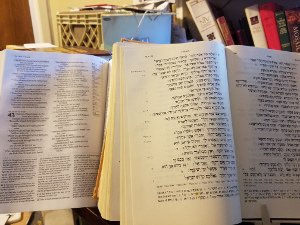Paul not Lucid
I must confess that quite frequently when I read J. K. Gayle’s writing, I’m quite mystified. But today I was able to interact with what he wrote more effectively in his post Exactly what Paul Meant by “Sarx”. Somewhere around the middle of that post he quotes C. S. Lewis from Reflections on the Psalms (p. 113 in his edition):
Descending lower, we find a somewhat similar difficulty with St. Paul. I cannot be the only reader who has wondered why God, having given him so many gifts, withheld from him (what would to us seem so necessary for the first Christian theologian [albeit a formidable Jew]) that of lucidity and orderly exposition. (Reflections on the Psalms, page 113)
He quotes more, and all of it is worthwhile. I think there is a balance here in that it is easy either to start to ignore precision in translation and simply be sloppy, while at the same time it is easy to get arrogant. I’m generally concerned when I hear pastors, especially those whose expertise in Greek is questionable, use the phrase “what the Greek really means here is …” This generally means that we’re going to hear the preacher’s translation substituted for that of the committee that produced whatever version their reading as though somehow the individual preacher in the minimum time required for translation has earned the right to claim a translation that is “what the Greek really means.”
I certainly feel free to disagree with translation committees or other translators or interpreters. But this usage in sermons tends to suggest that one has the inside track on what a Bible writer was saying and that others, often much more qualified, have simply missed the boat.
My impression on reading The Message was that Peterson very frequently manages very good translations of metaphors and imagery, yet when I read the teachings of Jesus, I thought he made them clearer than they were, so to speak. Sometimes he took the sharp edges off and made them more friendly. There is a point to leaving a difficult passage difficult. At the same time it is much too easy to call a passage difficult because one is struggling to find an expression, and thus make the passage more difficult in translation than in the original.

Thanks for the link (and the warning that my writing is usually ‘mystifying’ to many but sometimes can be more effective). Thank you even more for keying in on how supposed certainty about what Paul (or any writer) means is often rooted in a reader’s arrogance.
In rhetoric studies, there is acknowledgment that some writers are intentionally or, at times, unintentionally obscure. Jesus was not really a writer, but his rhetoric (i.e., his speech and his teaching) is not always easy to get. Likewise, Paul. Similarly, rhetors of various parts of Asia tend to use this sort of communication mode. It’s not to frustrate the reader or speaker, I think, but to get at profound issues that straightforward logic often misses.
I like your points here on translation. Hope more of us get that, especially as related to Bible translation.
I’ve posted two items on my Participatory Bible Study blog, the first on clarity of translation, On Translating to be Understood, and the second on just how clearly we understand the Bible writers in the first place, Paul not Lucid.Share this:Click to share on Twitter (Opens in new window)Click to share on Facebook (Opens in new window)Related